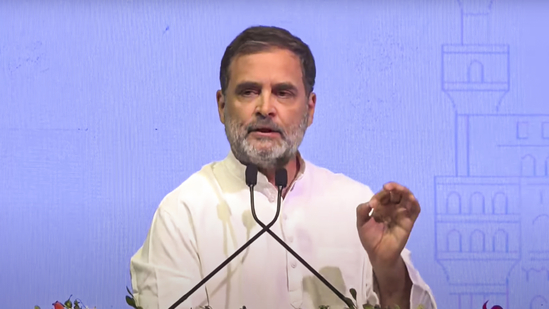Imagine a world where democracy isn’t just about casting a vote every few years but about who shapes the stories we believe, how power flows through society, and whether our systems can keep up with a planet in constant flux. That’s the bold vision Indian National Congress leader Rahul Gandhi laid out in a recent speech that’s got everyone talking—from political junkies to everyday citizens wondering what’s next for democracy.
In a time when global politics, democratic transformation, and political evolution dominate headlines, Gandhi’s words hit like a lightning bolt: Democratic politics have fundamentally changed worldwide. But what does that mean for you, me, and the future of governance? Let’s dive into his game-changing perspective and explore why this moment feels like a turning point for democracy in the 21st century.
The Winds of Change: Why Democracy Is Evolving
Gandhi didn’t just point out the obvious—he painted a vivid picture of a world where democratic systems are being reshaped by forces bigger than any one nation. Picture this: social media platforms like X amplifying voices (and misinformation) at lightning speed, populist leaders rallying crowds with divisive rhetoric, and voters demanding solutions to crises like climate change, economic inequality, and technological disruption. It’s a perfect storm, and Gandhi argues it’s rewriting the rules of global governance.
“Democracy isn’t just about elections anymore,” he said, his voice steady but urgent. “It’s about who controls the narrative, how power is shared, and whether our institutions can adapt to a world that’s changing faster than ever.”
He’s not wrong. From the United States to India, Brazil to Europe, political polarization is spiking, trust in institutions is wobbling, and digital transformation is turning traditional campaigning upside down. Gandhi’s speech zeroed in on three key drivers of this democratic revolution:
- The Social Media Tsunami: Platforms like X aren’t just tools—they’re battlegrounds where public opinion, misinformation, and political narratives collide. They’ve democratized speech but also muddied the waters, making it harder to separate fact from fiction.
- Populism’s Rise: Leaders who tap into widespread frustration are reshaping voter behavior, often sidelining nuanced policy debates for emotional appeals.
- New Voter Priorities: Today’s citizens care about sustainability, inclusivity, and economic justice—issues that demand bold, forward-thinking leadership.
These shifts aren’t just academic talking points; they’re reshaping how we live, vote, and govern. And Gandhi’s not just diagnosing the problem—he’s got a roadmap for what comes next.
Rahul Gandhi’s Call to Action: Reinventing Democracy
What sets Gandhi apart is his refusal to just lament the chaos. Instead, he’s calling for a progressive reinvention of democracy—one that’s inclusive, adaptive, and ready for the challenges of the digital age. Here’s what he’s proposing:
- Embrace Transparency: Governments must be open about their decisions, especially in an era where trust is fragile. Think real-time data on policy impacts or public forums that actually listen to citizens.
- Tackle Inequality: Economic and social disparities fuel distrust. Gandhi’s pushing for policies that prioritize fair wealth distribution and access to opportunity, drawing from India’s own complex journey.
- Harness Technology for Good: From AI-driven governance to secure digital voting, tech can strengthen democracy—if we get it right.
- Build a Global Coalition: No country can fix this alone. Gandhi envisions a worldwide network of leaders, activists, and citizens working together to protect democratic values while adapting to new realities.
His words resonate deeply in India, where democratic diversity—a nation of a billion-plus voices, languages, and cultures—offers both challenges and lessons for the world. But this isn’t just an Indian story. Whether you’re in London, Lagos, or Los Angeles, these ideas hit home.
Why This Matters to You
You might be thinking, “Okay, this sounds big, but what does it mean for me?” Fair question. The transformation of democracy affects everything—your job, your rights, your planet. When political systems evolve, they decide how your taxes are spent, whether your voice is heard, and how we tackle global crises like climate change or tech monopolies.
Gandhi’s vision is a wake-up call. It’s a reminder that democracy isn’t a spectator sport—it’s a living, breathing system that needs your input. Whether you’re sharing a post on X, joining a local advocacy group, or just voting with purpose, you’re part of this global political shift.
The Road Ahead: Hope or Hurdles?
Gandhi’s speech has lit a spark, but not everyone’s on board. Political analysts are buzzing—some call his ideas a “masterclass in understanding global democratic trends,” while others argue it’s light on specifics. Can progressive leaders really unite a fractured world? Will voters rally behind long-term reforms when short-term crises dominate?
These are valid questions, but one thing’s clear: Gandhi’s tapped into a truth we can’t ignore. Democracy in 2025 isn’t the democracy of a decade ago. It’s messier, louder, and more connected than ever. The question is whether we’ll shape this change or let it shape us.
Join the Conversation
So, what do you think? Is democracy evolving for the better, or are we headed for turbulence? How can we make sure inclusive governance, citizen empowerment, and political accountability win the day? Drop your thoughts in the comments or share this post on X to keep the conversation going.
Rahul Gandhi’s vision is a starting point, not a finish line. The future of global democracy depends on all of us—leaders, citizens, and dreamers alike. Let’s make it a future worth fighting for.

